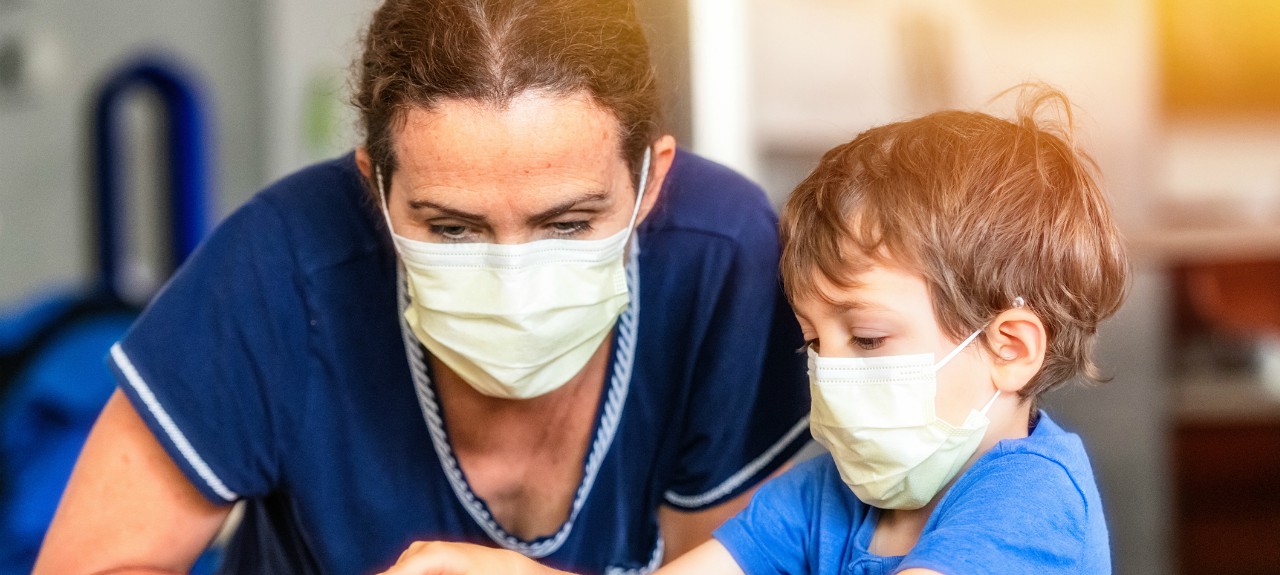The COVID-19 Response Fund supports childcare solutions for our region’s most vulnerable families.
By Sally Gillis, Managing Director, Strategic Impact and Partnerships
As parents face another uncertain school year, reliable childcare is needed more than ever. Childcare providers, who survived on thin margins before the pandemic, are now facing unprecedented challenges: decreased attendance because of social distancing and additional expenses from new health and safety requirements. If childcare providers are not able to survive through the crisis, children and parents will have an even harder time finding the care they need when the majority of the workforce returns to work, and families who lack financial resources will struggle disproportionately.
That’s why the COVID-19 Response Fund targeted a set of 40 grants—totaling $2.3 million—to support childcare providers who serve vulnerable families in the Puget Sound region. Here are just a few stories of these remarkable organizations.
Angela Griffin knows the urgency of getting children into childcare. As the executive director at Launch, a childcare provider that serves the Greater Seattle area, she worries that student learning disparities could become even more pronounced in the time of COVID. Angela sees a widening divide between families who can afford extra resources—such as learning pods and private tutors—and those who cannot.
Launch is using support from the COVID-19 Response Fund to ensure they can continue to serve all children, regardless of family income. “When students step into our space, everyone has access to the same materials, the same instructors, and the same opportunities,” Angela says. “Children from low-income families are most profoundly impacted by gaps in instruction, and the Fund has allowed us to provide free emergency childcare to essential workers who otherwise would not have been able to afford it.”
Launch has also been able to provide enriching virtual field trips and other learning activities for students through partnerships with other organizations. Partnerships during summer 2020 included working with Youth In Focus, which provided weekly visual arts and photography educational programming; STEM Paths Innovation Network, which offered hands-on technology and engineering experiences including circuitry lessons; and Triple Impact Coaching, which offered weekly virtual basketball clinics that focused not just on basketball and physical fitness, but also social-emotional skills like resilience, effort, discipline, goal setting and growth mindset.
Voices of Tomorrow (VOT) works to break the cycle of education disparity for immigrant and refugee children and plays a crucial role in supporting refugee and immigrant childcare providers as they serve families from their communities. Providing culturally responsive programs and direct services like early learning programs and dual-language preschool was important pre-COVID. Now these services are vital as refugee and immigrant families are feeling more isolated than ever before.
“Our providers are serving the most vulnerable families and helping them navigate new regulations, follow opening procedures, and secure supplies. This allows us to more deeply support our communities,” VOT Director Zam Zam Mohamed says. With a grant from the COVID-19 Response Fund, VOT has provided childcare workers PPE, technology, food, cleaning supplies, formula, and diapers to ensure that supplies are not a barrier to operations.
The psychological toll of the pandemic on children and childcare providers has also been particularly intense for refugees and immigrants. Illness and death of family members, isolation, and resource scarcity can trigger or retraumatize people who have been through war or difficult migration experiences. Through virtual group support with its providers, VOT provides mental health support sessions and on-going phone call support to keep in touch with their provider network and learns about obstacles the community is navigating.
Pike Market Childcare and Preschool has been operating in at Pike Market for nearly 40 years. The organization started as a service for Pike Place Market workers who had previously placed their small children in banana boxes in a back room while they worked. From the beginning, the childcare and preschool cared for the market workers’ children and made food with market ingredients. They have since broadened their reach, serving the surrounding community and uses a sliding-scale payment model is essential for families who otherwise would not be able to get childcare.
Pike Market Childcare and Preschools holds 51% of its spots for families with demonstrated income needs. “Many of our families are facing joblessness and food insecurity,” says Director Kathleen Richards. “After closing when the pandemic hit Seattle, when we reopened, we invited everyone back—regardless of income—because we knew that those who couldn’t pay were probably the families who needed support the most.” The COVID-19 Response Fund has allowed the organization to continue operating with reduced teacher-to-student ratios and sliding-scale payments.
Childcare Resources focuses on connecting Washington state families to childcare through its call center and works with families to find payment assistance for those who cannot afford care. Phoebe Anderson, the organization’s Chief Executive Officer, saw skyrocketing demand for their services in the spring. “When COVID-19 hit, our call center was absolutely overwhelmed,” she says. “Parents wanted to know their options for care and how to pay for it. Essential workers needed care, but at the start of the pandemic 40% of childcare facilities immediately closed. We’re at 20% closure now, but reduced child-to-teacher ratios have left many families without care.”
The organization’s focus on families of color and refugee and immigrant families, reach throughout the county, along with its anti-racist mission, made them a great match for COVID-19 Response Fund. Childcare Resources also assists the informal family, friend, and neighbor childcare networks that play an integral role in most communities, especially those with particular cultural or linguistic needs. These networks include overloaded caretakers who might have had a couple of grandchildren to care for before COVID and are now handling the children of multiple families.
These are just a few of the 40 organizations supported by the COVID-19 Response Fund’s childcare grants. Read more about these grants and the full list of grantees here.

